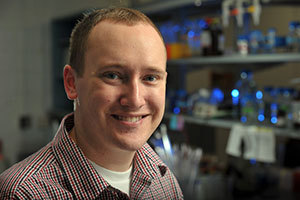 Zachary Schafer
Zachary Schafer
Metastasis, the process by which cancer cells leave the primary tumor and spread to other sites in the body, is responsible for more than 90 percent of cancer deaths. Thus, there is a significant need to improve the therapeutic options for patients who suffer from metastatic disease. New research from the laboratory of Zachary T. Schafer, associate professor in the Department of Biological Sciences, Coleman Foundation Collegiate Chair of Cancer Biology and researcher in the Harper Cancer Research Institute at the University of Notre Dame, could lead to these new therapies.
In order for cancer cells to metastasize, they need to shut off cell death pathways and simultaneously alter defects in cellular energy production. The researchers studied specifically Ras mutations. Ras is a proto-oncogene, which means that it is a gene present in normal, non-cancerous cells. When there are specific changes or mutations in the Ras DNA, this mutation can contribute to the development of cancer. While Ras mutations are most commonly found in cancers of the lung, colon and pancreas, Ras is the most commonly mutated proto-oncogene observed across all human cancers.
“We discovered that for cancer cells with Ras mutations, shutting off cell death pathways can be accomplished through regulation of two distinct proteins: SGK-1 and PHLPP1,” Schafer said. “We found that Ras mutant-containing cancer cells lacking attachment to extracellular matrix, as would be the case during metastasis, activate the SGK-1 protein, which results in an increase in energy production. This increase in energy production improves the survival of these cells. At the same time, Ras also causes a decrease in the amount of PHLPP1 protein, and thus the ability of PHLPP1 to cause cell death is diminished. In aggregate, these two cellular changes (SGK-1 activation and PHLPP1 loss) facilitate long-term survival of cancer cells during metastasis.”
While more research needs to be completed, the findings suggest that an effective strategy to eliminate metastatic cancer cells with Ras mutations might be to concurrently inhibit SGK-1 activity, thereby blocking energy production, and restore the ability of PHLPP1 to cause cell death.
“We are currently in the process of expanding our studies to better understand if SGK-1 and PHLPP1 are important in controlling the survival of metastatic cancer cells at different periods of time during metastasis; for example, when cells first leave the tumor vs. when they arrive at a secondary site,” Schafer said. “We are also assessing which cancers SGK-1 and/or PHLPP1 are most important for regulating cancer cell survival. The current study was completed in mammary epithelial cells and lung cancer cells, so it is necessary to understand if these molecules are, as we would hypothesize, similarly involved across a variety of distinct cancers.”
The research was supported by Schafer’s Research Scholar Grant from the American Cancer Society and by a grant from the Phi Beta Psi National Project. The lead author on the study was Joshua Mason, a doctoral student in biological sciences.
“This manuscript is really a tour de force that is a testament to Josh’s boundless energy and tenacious work ethic,” Schafer said.
The research is described in a paper that was featured in the journal Cell Death and Differentiation and can be viewed here: www.nature.com/cdd/journal/v23/n8/full/cdd201615a.html.
Contact: Zachary T. Schafer, 574-631-0875, zschafe1@nd.edu
Originally published by William G. Gilroy at news.nd.edu on August 18, 2016.